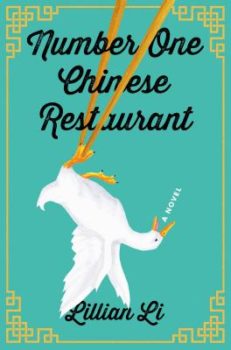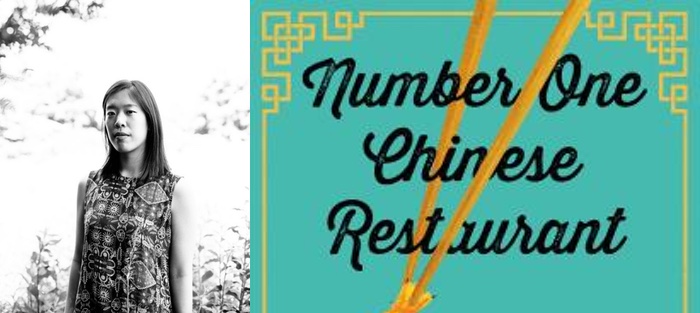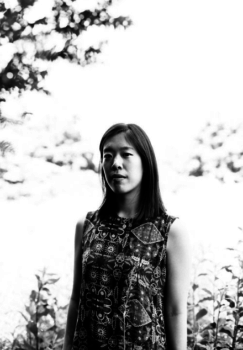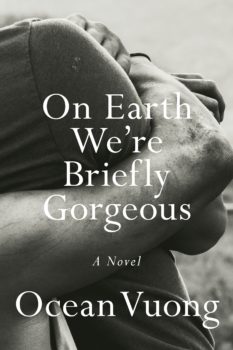Lillian Li’s Number One Chinese Restaurant (Henry Holt, 2018) hits the ground running: Jimmy Han sits in a restaurant booth across from a nine-fingered gangster, trying to decide whether he actually has the guts to burn his father’s Chinese restaurant to the ground.
Around them, the restaurant’s controlled chaos rages, the rest of the staff so wrapped up in their own lives they hardly notice Jimmy and his guest. Ah-Jack and Nan, servers and friends for decades, contemplate taking their relationship to the next level; Nan’s teenage son, Pat, and Jimmy’s niece, Annie, slip away to kiss in the walk-ins; and alone in her suburban mansion, Jimmy’s mother Feng Fei schemes to keep her late-husband’s legacy afloat.
By turns funny, maddening, and moving, Number One Chinese Restaurant explores the ways loyalty and love can both sustain and break us. I spoke to Lillian Li via email about the process of writing her debut novel.
Full disclosure: Lillian and I are friends. We both graduated from the University of Michigan Helen Zell Writers’ Program in 2015. For two of our three years in Ann Arbor, we lived across the street from each other. We spent a lot of time on each other’s couches, watching double features of Broad City and How to Get Away with Murder.
Interview:
Emily Nagin: Your novel started out as a short story. I remember in workshop, the story came with a little note asking if we thought you should turn it into a novel, and we were all like, hell yeah! Could you talk about the seed for that story? How did you know it had the potential to grow? What was the process of expanding it?
Lillian Li: I love that you remember that! So actually, by the time I workshopped the story, I had already intended (or hoped) to write a novel that took place in a Chinese restaurant. But when I first realized this hope, the first thing I felt was extreme doubt and insecurity. I had worked very briefly in a Chinese restaurant and that bit of experience didn’t feel like enough to fill an entire book. So I wrote the short story in order to test my comfort with the Chinese restaurant space, as well as my comfort with the space inside the owners’ and employees’ heads. I told myself that if it was too much of a struggle writing a fifteen-page story, then I had no business taking it to the next level. Luckily, the short story was no harder to write than any others, and in fact it felt exhilarating to discover how well lived experience supplemented the imagination without taking it over entirely.
As for the process of expanding a short story into a novel, I have to thank my professor Eileen Pollack for helping me figure that out. When I first went to Eileen with my novel the plot I had planned was almost identical to that of the short story I’d written. Without having known about this pre-existing story, Eileen immediately called it out as a short story plot. She really guided me into finding a plot big enough for a novel, which was essentially finding a conflict that would take hundreds of pages to resolve. That was the hardest part of expanding from a short story to a novel, realizing they were completely different forms and to write a good novel I would have to leave the most significant elements of the original short story entirely behind. Not just the plot, but also the characters and thematic questions. I’ve actually been considering going back to work on the short story in order to return to those questions, which still feel important for me to explore.
 I’ve worked in restaurants, and your restaurant scenes felt so spot-on to me. Aside from waiting tables, did you do additional research? What was the process of creating these worlds?
I’ve worked in restaurants, and your restaurant scenes felt so spot-on to me. Aside from waiting tables, did you do additional research? What was the process of creating these worlds?
I did do additional research in order to flesh out the characters’ backstories (especially those who’d immigrated to the US), and to figure out some setting questions (what does the inside of a county jail look like?), but my favorite bit of research was when I interviewed a fire investigator to learn, essentially, how to commit arson.
I think you’ll remember this, but our first year in the MFA there was a pizza place that burned down in the middle of winter under suspicious circumstances. I ended up finding an online article that named the fire investigator, Kathleen Summersgill, which led me to her government website, which led me to her email address. I wasn’t expecting her to email me back, but she did almost immediately! I hadn’t yet realized what I realize now, which is that most people like talking about subjects they know a lot about, like their jobs, even if it’s with a total rando.
We met for coffee, I ran her through my ideas, and she told me what was physically impossible, which was all I had planned to talk about. But then I got curious about her job and started asking questions that weren’t tied to the book. That second half of our conversation was almost more beneficial than the first. I learned so much about how fire works and firefighting tactics—things that I hadn’t even known to ask about. I ended up completely rewriting a major plot point based on that forty-five minute conversation. Google is great, but I always remind myself of Kathleen when I feel reluctant to reach out and talk to someone for research.
It’s true! People do usually want to talk about their jobs. And as a writer, just knowing your stuff can help you write more confidently and realistically.
In that vein—your characters span a pretty wide age range, from late teens to mid-60s. What’s it like writing characters so much older than yourself? How do you get into that headspace?
Again, Eileen had to give me a pep talk, because I was initially quite frightened of writing older characters. She essentially told me to stop thinking of older folks as a different species, that they think much like younger folks do, except, perhaps, when it comes to thinking about physical comfort and mobility. When I did a little more research, I found that a person’s perception of their age often does not match their physical age, with many people’s mental image of themselves being younger than they are. All this gave me enough confidence to start writing into that space.
At the same time, I’m not going to pretend like I know how to writer older characters perfectly, or even all that well. Ultimately, I felt like I could write these characters because of the setting I’d chosen. When characters have spent the bulk of their adult lives inside a restaurant, they realistically have not had the same opportunities to grow and change and learn the way their non-restaurant counterparts have. This state of stagnation felt like something I could tap into, or rather, it felt like something I could imagine my way into.
It’s clear that you really got into your character’s heads and hearts. There’s a lot of compassion for your characters in your writing, but you also don’t let any of them off the hook. When they’re being jerks, the reader isn’t exactly encouraged to sympathize with their behavior, even if we do understand why they’re behaving the way they are. As a writer, there can be this instinct to either protect your characters or punish them excessively, but you find this great middle ground. How do you balance empathy for your characters with holding them accountable?
A friend recently quoted a line from Charlie Baxter’s The Soul Thief that I found particularly resonant: “When you are burning, you are blinded to the other fires.” I think this is the mindset I try to put myself in when I’m writing characters, that your own suffering and desire can so easily and understandably blind you to the suffering and desire around you, as well the suffering and desire directly caused by you. I think that’s why I love writing in close third—it’s a POV built to show how all-encompassing one’s own fire can be, while at the same time revealing the existence of other fires.
That’s a really great way to explain close third!
Along those lines, one thing I loved about this book was the way it seemed set up good guy vs. bad guy dichotomies (Jimmy vs. Johnny, Ah-Jack vs. Ray) that look black and white but then become very murky. You don’t let anyone be a pure hero or a pure villain, except maybe Uncle Pang—but even he is charming in a creepy way. Did you set out to accomplish that, or did it happen more organically? And if there were a hero of this story, who would it be?
I think we tend to want to divide not just people, but all the components of the world into those two categories of good and bad, to the point that almost every word now has either a positive or negative connotation. Generosity is good. Anger is bad. But I’ve seen generosity that is self-destructive and I’ve seen anger that empowers. And if simple virtues/vices are secretly murkier than we understand them to be, how can we expect people to be any less so? Anyways, that’s a roundabout way of saying that I like binaries, but only if I get to play with them and break them down. I didn’t notice those dichotomies though! That’s very cool!
If I had to name a hero, I’d probably say it’s the mother character, Feng Fei. She’s just as difficult and complicated as everyone else, but she also possesses a clear-eyed, nonjudgmental understanding of the kind of person she is—the good, the bad, and the overlap. I don’t think there’s anything you could say to Feng Fei about herself that would surprise or shame her. I find that pretty heroic, the ability to really look at yourself and accept what you see.
Oooh, my next question was about Feng Fei! About two-thirds of the way through the book, we learn about a parable she used to tell her sons, Jimmy and Johnny. Could you summarize the parable and talk a bit about why you included it and why you gave this story to Feng Fei to tell?
I love that fable: Basically a donkey hears its owner laughing one day because a monkey has climbed onto the roof and is doing a little dance. The donkey gets up on the roof as well and starts dancing, but its hooves break through the roof. The owner beats the donkey, and when the donkey asks why the owner laughed at the monkey, but not at him, the owner says, “Because it is a monkey, and you are a donkey.” Moral of the story—don’t be what you’re not. Essentially the dark side of be yourself.
Whenever I tell someone this fable, they always shudder or make a little noise. It feels cold and pragmatic, even fatalistic, but I’ve always found it to be quite freeing advice. You are what you are, and there is the potential for strength in every component of what you are. The donkey isn’t punished for being a donkey, the donkey is punished for forgetting he’s a donkey. Okay, maybe that is dark. But it’s dark and hopeful at the same time.
There is a thread of survival in the fable, and I think that’s ultimately why I chose to give it to Feng Fei to tell. That woman knows what it takes not only to survive, but also to thrive in any environment, which often means throwing away romanticism and using the tools at her disposal. Her love for her sons means that she needs them to learn this lesson as well, to face the dangers of the world that she knows are out there. Feng Fei’s feelings might not be as easily legible as the other mothers and fathers in this book, but I think her retelling of that fable is proof that she really loves her family.
Did you have a favorite character to write? Who was it and why?
Feng Fei and Ah-Jack were both really fun to write. Ah-Jack because his class-clown personality means I can play with a larger range of believable responses and actions. I can have Ah-Jack wrestle with a busboy, get someone drunk on Mai Tai’s, tell a fart joke—he’s just such a goof. I remember in earlier drafts, I would get into Ah-Jack’s voice by putting exclamation marks after most of his statements. As for Feng Fei, she was fun to write because everything she says is both mean and true. She makes things happen in a scene, and she makes me laugh.
Okay, last one. I always ask this one, and I’m not letting you off the hook. Pick either Ah-Jack or Feng Fei and tell me a song they love but are embarrassed by.
Hahaha, okay, so I’m going to answer for Ah-Jack because as soon as I read this question, a song popped into my head that makes no sense and yet also makes perfect sense. Ah-Jack’s favorite guilty-pleasure song is Gangnam Style by Psy.







